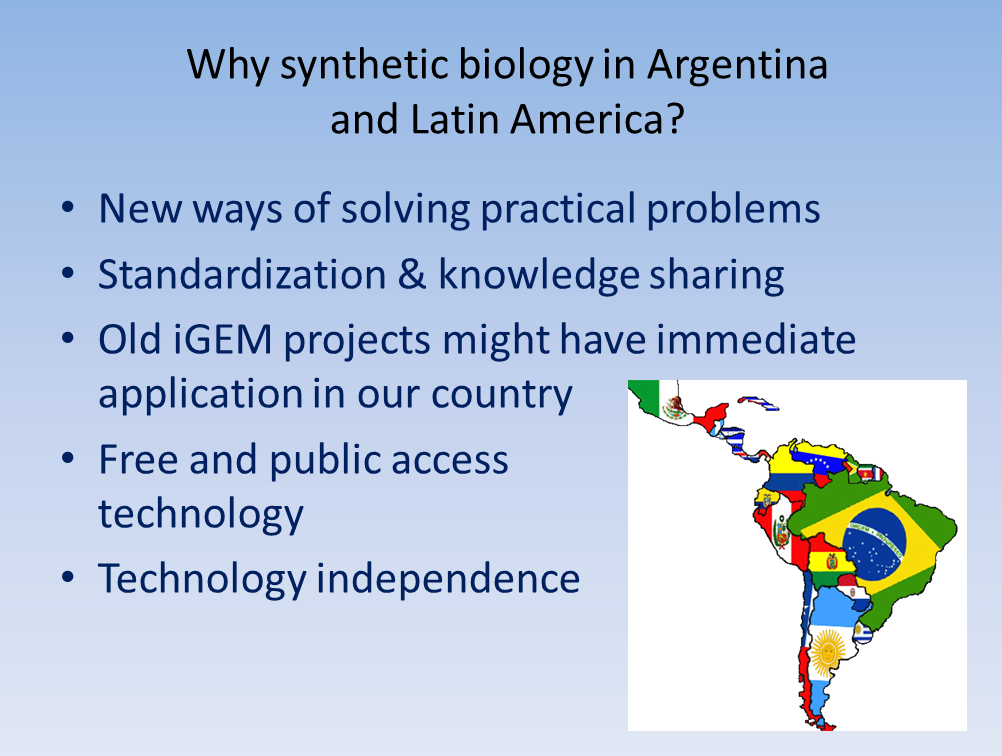Team:Buenos Aires/HP/GarageLab
From 2012.igem.org
(→Garage Lab) |
(→Garage Lab) |
||
| Line 6: | Line 6: | ||
However it grew up to be a multitasking group, touching subjects as Neuro-robotics, Contamination assessment, Data Privacy and Management, Personalized Medicine, Public Information and Problematics of Open Innovation. | However it grew up to be a multitasking group, touching subjects as Neuro-robotics, Contamination assessment, Data Privacy and Management, Personalized Medicine, Public Information and Problematics of Open Innovation. | ||
| - | + | ||
| + | Now a days, the group has 22 active members and 5 projects with Non governmental organizations. | ||
They are evolving in order to become an institution and in process of building an infrastructure that would allow the resolution of high impact issues, as much as bigger workshops, hackatons, talks, conferences and developments. | They are evolving in order to become an institution and in process of building an infrastructure that would allow the resolution of high impact issues, as much as bigger workshops, hackatons, talks, conferences and developments. | ||
Revision as of 18:22, 24 September 2012

Garage Lab
GarageLab is a group of scientists, artists and engineers cofounded by Emiliano Kargieman and Dario Wainer in 2009 as a Workshop about Bioengineering at the University of Palermo.
However it grew up to be a multitasking group, touching subjects as Neuro-robotics, Contamination assessment, Data Privacy and Management, Personalized Medicine, Public Information and Problematics of Open Innovation.
Now a days, the group has 22 active members and 5 projects with Non governmental organizations.
They are evolving in order to become an institution and in process of building an infrastructure that would allow the resolution of high impact issues, as much as bigger workshops, hackatons, talks, conferences and developments.
You can find out more about this creative and talented group of people at: http://garagelab.tumblr.com/
Our project together
At the beggining of 2012, Garage Lab made a contact with our coordinators in order to begin a productive relationship. They believe in the impact that the use of the standard parts of Synthetic Biology could have in our country, in order to solve endemic issues and they want it to become part of their projects and society.
Shortly after, they came to our laboratory and together we planned on giving use to the parts that come in the Kit in order to assess a key problem in Buenos Aires, which is the contamination present at Riachuelo, a main branch of Río de la Plata. Several thousands of people live at the coast and nearby this highly polluted area which has been prooven very hard to remediate from the environmental point of view, but also, a political challenge given its social implications.
We therefore came with a plan for after the Jamborees, that we would use the arsenic
EMBO Course Buenos Aires 2012
In April 2012, our university held the first Latin American EMBO Global Exchange Lecture Course which at the same time has been the first Latin American gathering of people that are interested in Synthetic Biology.
This course is held by the second time, but it just became international this year. The idea came from our coordinators Alejandro Nadra and Ignacio Sanchez, from the Biological Chemistry Department at the University of Buenos Aires together with Raik Grünberg from the Centre for Genomic Regulation (Spain) and Alejandro Colman-Lerner from the Department of Physiology, Molecular and Cell Biology at University of Buenos Aires.
Here, students from the region were invited to learn and share their thoughts. We had lecturers from invited speakers, including several of the first iGEM founders. Besides, we were presented as the First Argentinian Team to participate in iGEM and
You can check this year course at http://events.embo.org/12-synthetic-biology/
The response was amazing, the university received students coming from Mexico to Chile and the outcomes were fabulous: Latin America is a growing region and a great promise for this upcoming discipline.
Part of the conclusions arrived at the course is that we are certain that many local problems can be solved through Synthetic Biology. Furthermore, the free exchange of knowledge and technology, which are the basis of the competition, are invaluable for the region.

|
 "
"